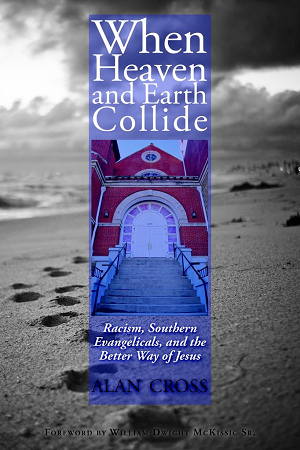By Bob Allen
A Southern Baptist pastor and author of a book investigating what went wrong with race and religion in the American South says the Southern Baptist Convention should stop claiming the convention’s founding purpose was missions.
 Alan Cross, senior pastor of Gateway Baptist Church in Montgomery, Ala., said in a recent blog that the claim he has heard his whole life — that the SBC organized around and for the cause of missions — is only technically true.
Alan Cross, senior pastor of Gateway Baptist Church in Montgomery, Ala., said in a recent blog that the claim he has heard his whole life — that the SBC organized around and for the cause of missions — is only technically true.
Delegates from Maryland, Virginia, North Carolina, South Carolina, Georgia, Alabama, Louisiana, Kentucky and the District of Columbia gathered May 8-12, 1845, in Augusta, Ga., for the stated purpose of devising a plan for “eliciting, combining and directing the energies of the whole denomination of one sacred effort, for the propagation of the gospel.”
What many ministers don’t learn until seminary is the meeting was convened only after the American Baptist Home Mission Society refused to appoint a Georgia slaveholder nominated as a missionary candidate to test northern Baptists’ professed neutrality on the abolition of slavery.
Cross, author of When Heaven and Earth Collide: Racism, Southern Evangelicals, and the Better Way of Jesus, said repeating only the sanitized version of the story in fundraising appeals “is kind of like Brian Williams misremembering which helicopter he was on in 2003.”
“It isn’t even a useful story,” Cross said. “Do SBC leaders really think that getting us to believe that the SBC started over missions will motivate us today to give our lives to missions?”
Cross said sectional differences over slavery also split Methodists and Presbyterians and that South Carolina’s John C. Calhoun warned the division of Protestant denominations in the 1840s was precursor to dissolution of the union in a speech to the U.S. Senate in support of the Missouri Compromise of 1850.
Cross said removing the political context of the split “makes us seem as though we were people led by Scripture, when in reality, we were led more by culture and cultural conformity that caused us to side with the oppression of millions.”
 Cross, who identifies as a conservative, said that recognition is particularly relevant in the call heard so often “for a ‘return’ to the days when the SBC was biblical and held to the pristine theology of our Founders.”
Cross, who identifies as a conservative, said that recognition is particularly relevant in the call heard so often “for a ‘return’ to the days when the SBC was biblical and held to the pristine theology of our Founders.”
Cross said in five years researching his book he had difficulty finding anyone talking about the issue from “within the tradition of white Southern Evangelicalism.” Most of what was written, he said, was from the perspective of Southern Baptists who today would be described as “moderates.”
He said SBC leaders and theologians he approached expressed little interest in discussing his research, most thinking it was something in the past that Southern Baptists dealt with in an apology to African Americans on the convention’s 150th anniversary in 1995.
At the 2014 SBC annual meeting last June in Baltimore, Cross made a motion requesting a task force “to assess our current progress in pursuing biblical reconciliation within our convention and make concrete recommendations to the messengers regarding how Southern Baptists, facilitated by the convention’s entities and seminaries, may better reach, make disciples, and raise up leadership from and among diverse racial and ethnic groups in North America.”
The SBC Executive Committee discussed the motion in September, requesting convention entities to include “a robust descriptive report of ethnic participation” in their annual reports, and is scheduled to consider it further when the Executive Committee meets Feb. 16-17 in Nashville, Tenn.
Cross said conservative white evangelicals are finally starting to address race in the wake of events like the police shooting in Ferguson, Mo., the movie Selma, and reaction to President Obama’s remarks at the recent National Prayer Breakfast.
Cross said he is encouraged by SBC Ethics and Religious Liberty Commission President Russell Moore’s initiative in organizing a leadership summit on “The Gospel and Racial Reconciliation” scheduled March 26-27 in Nashville.
“The SBC might not have actually gotten started over missions, but we have a chance to witness to Christ in pretty dramatic ways in a world still broken over racial and ethnic division,” Cross said.
“Let’s stop saying that we started over missions. Let’s be honest about our beginnings and make every effort to humbly lead in bringing healing to our communities and our nation in the area of racial division by lowering ourselves and taking the nature of a servant as the Cross works on us.
“Let’s do this in our hearts and in our local churches and allow the gospel to work real humility in us as we seek to serve our communities in sacrificial ways. Let’s tell a better story than the one we have told in the past.”
